Kevin Clarke
Operetta Research Center
27 May, 2019
With an Offenbach conference coming up in June in Cologne that includes a section dedicated to “Discourses and Identities” and a talk on “The Birth of Operetta from the Spirit of Pornography” it seems only fitting that a “Revealing New Musical” called Shooting Star should premiere a few weeks earlier which takes a closer look at today’s porn industry and combines elements that Jacques Offenbach and his authors also used back in the 1860s.
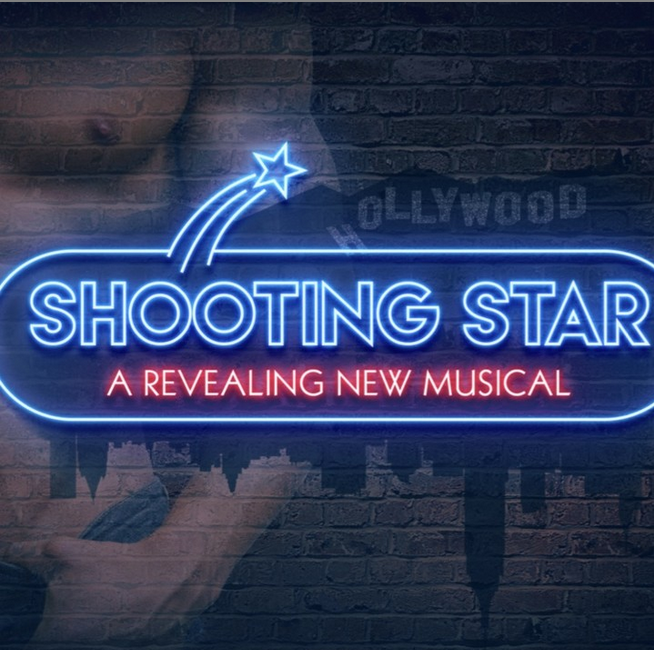
The poster design for “Shooting Star” in Los Angeles.
As I sat in the small Hudson Theatre in Los Angeles last week-end, for the world premiere of Shooting Star, lines from Émile Zola’s novel Nana (1880) went through my head: we read there that in the midst of an operetta performance at the Théâtre des Variétés the star, young and attractive Nana in the role of Venus, appears naked and that a shiver goes through the house. “The men’s faces were tense and serious, their nostrils narrowed, their mouths prickly and parched,” writes Zola about Nana’s effect on the audience. Her sensual exposure opens “the gates of the unknown world of desire.” Moving forward 150 years, I can only say that watching young tenor Taubert Nadalini in the male lead role of Taylor Trent also sends a shiver through my body when he suddenly takes off his clothing, playing a porn actor on the set of a porn shoot, doing what porn actors do under such circumstances. (Which you don’t actually see in the staging by Michael Bello, it’s blackened out by stroboscopic light; but you get a pretty good idea anyway.)
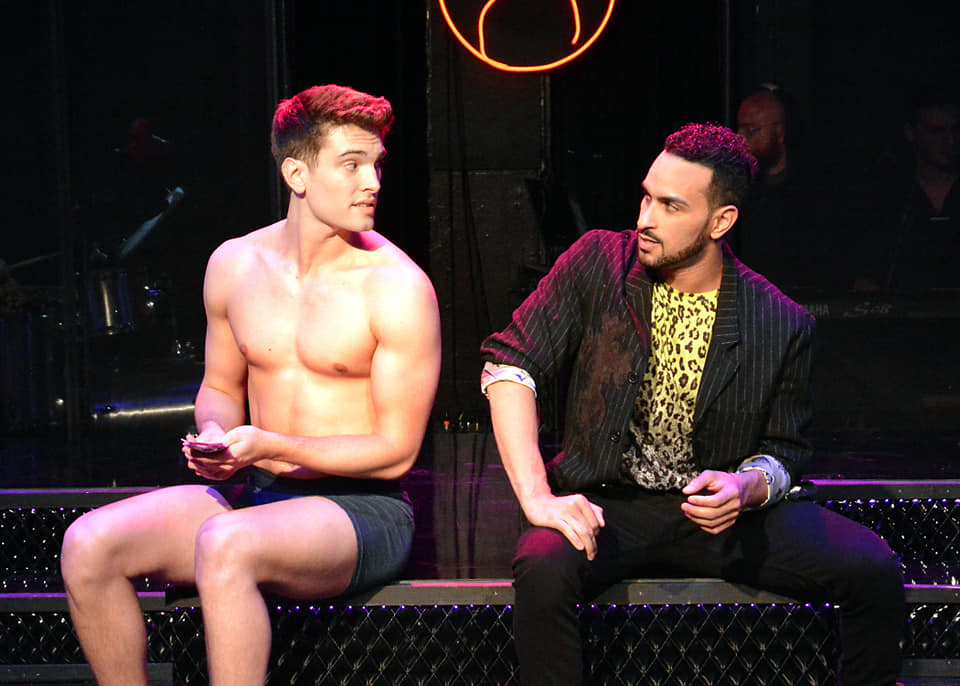
Taubert Nadalini and Bettis Richardson (r.) in “Shooting Star.” (Photo: Ed Krieger)
Seeing the handsome and endearing Mr. Nadalini fully exposed creates a highly uncomfortable, even disturbing effect – it displays the boy-next-door-character like a piece of raw meat, and it forces the viewer to consider his/her reaction(s). It’s a balancing act, a provocation and stimulation, a slap in the face and incredibly arousing, all at the same time. It makes me wonder if that’s how Nana’s audience might have reacted back in the Parisian opéra-bouffe days of the 1860s and 70s?
In her book Bound and Gagged Laura Kipnis writes that “coursing through pornography’s dimly lit corridors are far larger issues.” She recommends “reading between the bodies” to get to a deeper meaning of things. And there is a deeper meaning to Shooting Star, just as there is a deeper meaning to Offenbach’s “obscenity” so criticized by his contemporaries.

“Die neuesten Noten des Herrn Jacques Offenbach,” i.e. the latest compositions from Mr. Jacques Offenbach. From: Kikeriki, 1865.
As in Nana, the main character in Shooting Star is dreaming of a career in the spotlight – with adoring fans and big pay checks. His career is the way out of provincial life. And just as Nana cannot quite manage to make it onto the “respectable” stages of Paris, Shooting Star’s Taylor Trent’s dream of a “legit” film career in Hollywood doesn’t quite happen. So he chooses an alternative path that runs parallel to the “real” world, and that is a copy of this “real” world, just like the demi-monde world was, so strongly associated with Offenbach. It’s a world many don’t wish to acknowledge or talk about publicly. Even though everyone consumes it, admires it, lusts after it, but feels slightly ashamed of. Even in this day and age.
I shared my ideas about “The Birth of Operetta from the Spirit of Pornography” with a famous operetta researcher recently and got much inspired feedback. But when I asked him if he fancied writing something about the topic himself he declined, saying it would ruin his reputation as a serious theater historian. Notwithstanding the fact that Linda Williams published her book Hardcore as far back as 1989, opening academia for porn research and teaching at Berkeley University. In 2013 Elizabeth Wollman published Hard Times: The Adult Musical in 1970s New York City with Oxford University Press without ruining her reputation. She states: “Most [of these adult musicals] were meant to comment on the sociosexual mores of the time: to criticize them, praise them, educate audiences about them, spoof them, and capitalize on them.”
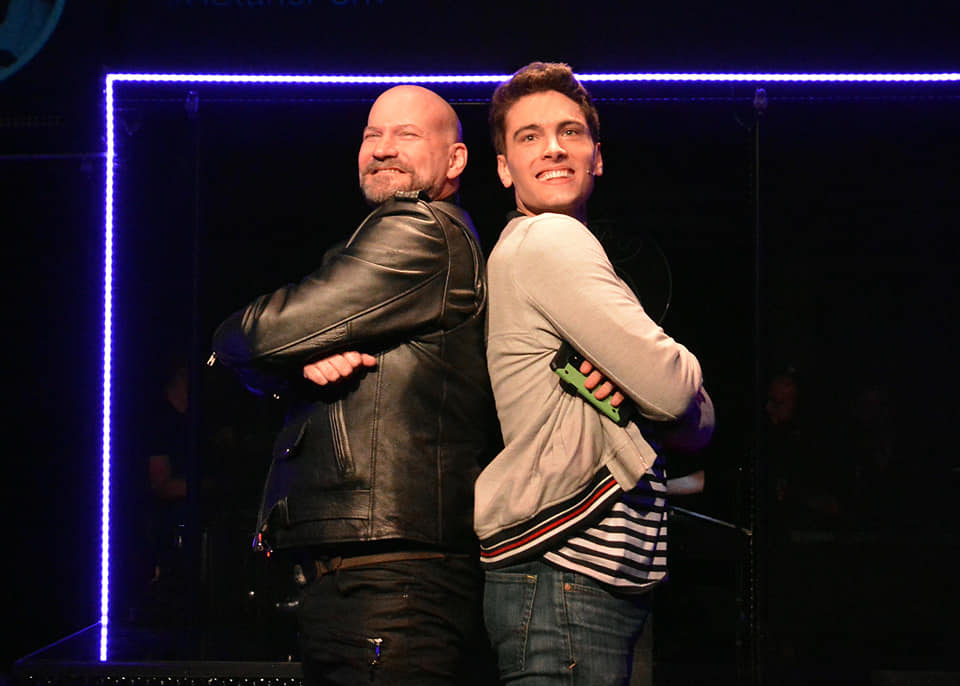
Michael Scott Harris (l.) and Taubert Nadalini in “Shooting Star.” (Photo: Ed Krieger)
While I am still waiting for a book on the Adult Operettas of the 1860s (“groveling in a low depth, even below decency,” as The Tribune wrote about Offenbach’s Genevieve de Brabant in 1870), Florian Klein and his Shooting Star team have certainly written an “adult” musical about sociosexual mores of our time: they show how an aspiring young actor from Indiana comes to California, cannot land a job at auditions because he comes across as “too gay,” starts working as a waiter, then a go-go boy, and finally as a porn actor as a last effort to pay his bills. In the course of two acts this innocent boy is sucked into a world of easy sex that makes young good-looking “things” instant stars, but also drops them just as quickly when the next good-looking person comes along. How can one fulfill one’s dream of “acting” under such circumstances, how can one find love and a relationship while being a sex worker, how does one tell one’s parents about such a career move, and what comes after the short blast of x-rated fame?
You’ll recall that Nana’s career ends tragically and with the heroine’s death. Florian Klein – better know under his porn name “Hans Berlin” – has chosen to not morally punish his on-stage alter ego Taylor Trent. He gives him a happy way out and a gay marriage with his co-star Jesse Apollo (played by Nathan Mohebbi). And composer Thomas Zaufke has written the most awesome love ballads for them both!
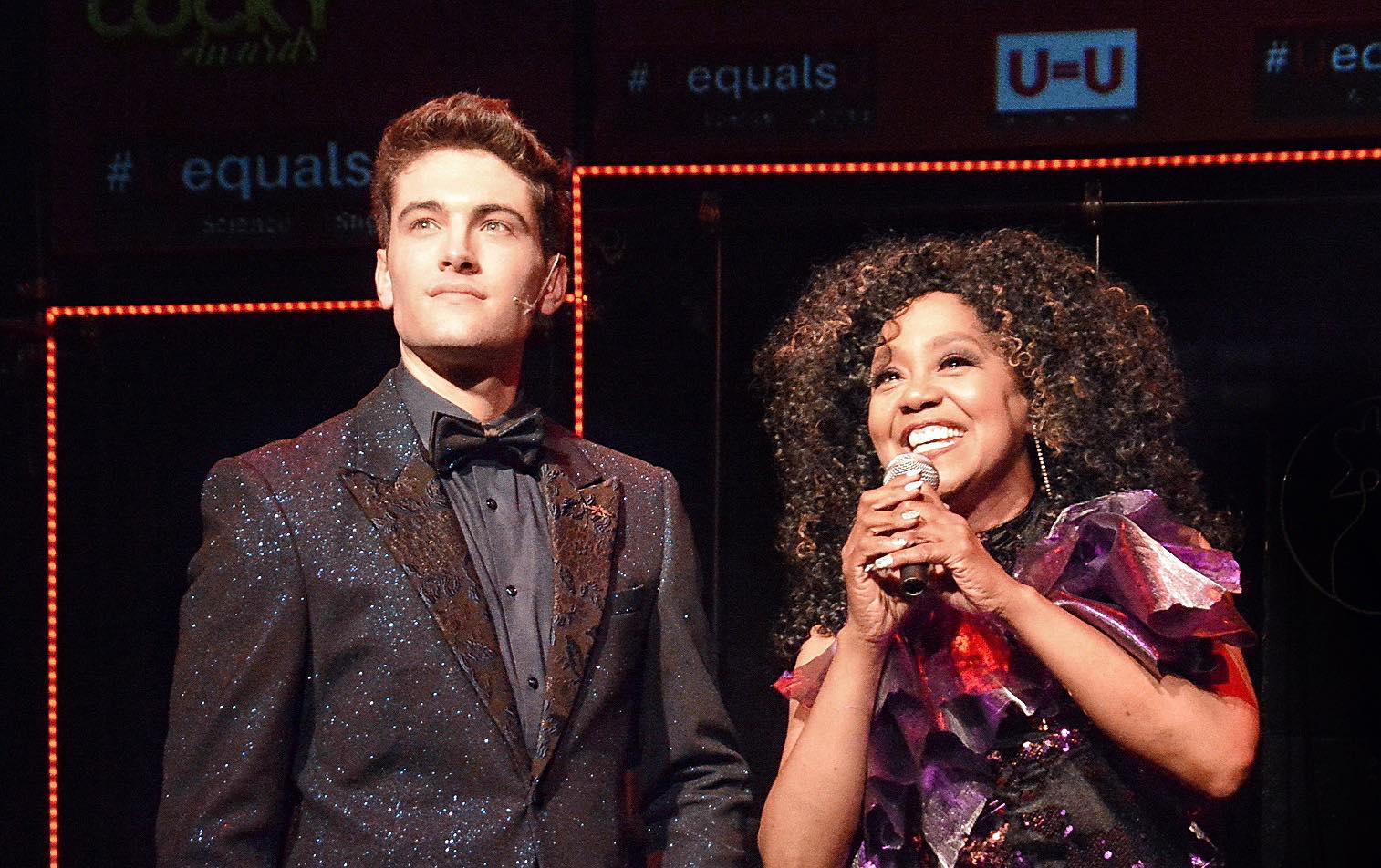
Taubert Nadalini and Karole Foreman in “Shooting Star: A Revealing New Musical” in Los Angeles, 2019. (Photo: Ed Krieger)
Mr. Zaufke is well-known in Germany and Austria for shows such as Grimm and Baby Talk, or most recently Der Hase mit den Bernsteinaugen/The Hare With Amber Eyes which premiered at Oper Linz in April 2019. He has turned the various scenes Mr. Klein has written, together with lyricist Erik Ranson, into a musically flowing narrative that effortlessly crosses between up-beat numbers such as “Party Like a Porn Star” to the introspective “My Heart is Open to You” or the poignant “He Was My Friend,” a lamento overwhelmingly sung by Karole Foreman as “gay porn mama” Mr. Sue, modeled on real life gay porn mama Mr. Pam.
While the show touches upon the dark sides of the industry again and again (from drugs, erection injections, personality disorders, to shady business deals and an almost atrociously bad fashion sense – marvellously captured by costume designer Angela Wendt), it doesn’t go down a pessimistic dark path, instead focusing on the positive sides. Having Taubert Nadalini make the sentimental journey from wide-eyed innocence to unpleasant porn superstar and back to a loveable and wiser actor who leaves the industry is a real casting coup.

Taubert Nadalini as Prince Hans in “Frozen.” (Photo: Instagram/TaubertNadalini)
Mr. Nadalini recently played Prince Hans in a live action version of Frozen. A real life Disney prince as Taylor Trent is comparable to having Disney’s Garret Clayton as Brent Corrigan in the recent movie King Corba; it emphasizes the sinister fairy tale aspect of the story, but it also makes this story incredibly touching. And watching Mr. Nadalini’s knock-out performance is touching – he literally glows on stage and brings a vulnerability to his songs that lifts the Zaufke music off the page and into a different realm. A friend of mine started crying listening to Nadalini/Trent pouring his heart out in the various ballads.
While I sat thinking of Nana many times during Shooting Star (there are various scenes involving nudity) I also wondered if Mr. Nadalini could make a real operetta hero, too? In his review, Steven Stanley calls him one of “the most triple-threat-tastic performers in town.” At the top of my operetta wish list, triple-threat Nadalini would be perfect as Landry in Herve’s Chilpéric, a role Claude Marius performed in London and which Emily Soldene raves about in her memoirs, grinning that every girl in the stalls dreamed of making love to Mr. Marius.

C. D. Marius as Landry: the “masculine masher” in Hervé’s “Chilpèric.”
Opéra-bouffe as sexual fantasy and stimulation: it’s not far removed from Shooting Star. For a serious Hervé revival Mr. Nadalini should be considered as a first choice. Or a revival of Adonis, the boylesque retelling of the famous Galatea saga from the 1880s. Mr. Nadalini’s singing – including an expressive upper range – would be ideal for both.
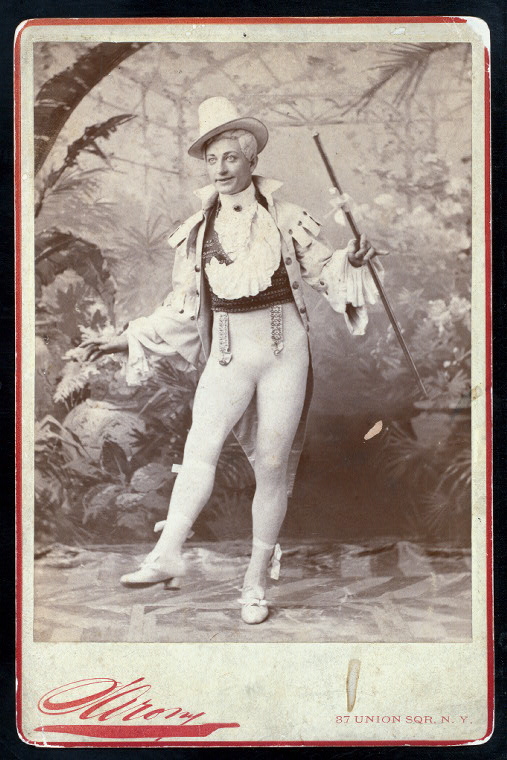
Henry E. Dixey in “Adonis,” 1884, photographed by Sarony.
Talking of operetta, there are a few operetta veterans involved in Shooting Star, among them Michael Scott Harris as aging 1980s porn legend “James Grant” – he has a vocal stand-out moment with “These Golden Days” of almost Rombergian expansiveness. Mr. Harris has sung a lot of Gilbert & Sullivan in the past, including Frederic in Pirates of Penzance, Ralph in HMS Pinafore, and Naki-Poo in Mikado. Davey Miller as a go-go dancer was also in a Pirates of Penzance production and the superb Christopher Robert Smith, who plays nasty porn producer “Martin Lords” (modeled on real life producer Michael Lukas) wasn’t just a Men’s Health center model for two years but also the Pirate King in Pirates of Penzance. Lucky Savoyards, I’d say.
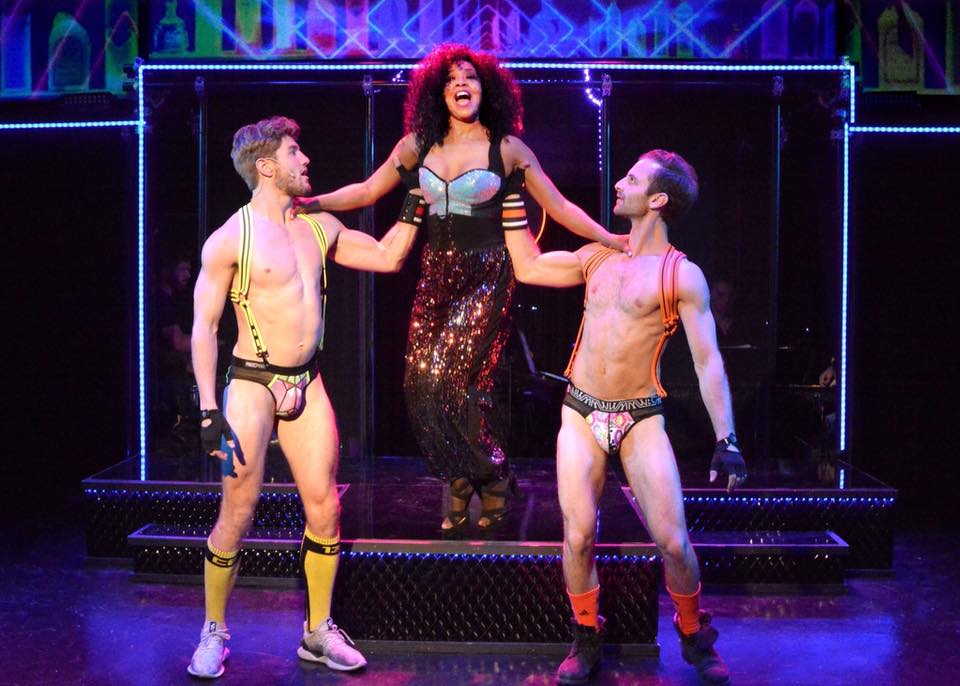
Karole Foreman as “gay porn mama” Mr. Sue with two of her go-go dancers: Davey Miller (l.) and Ryan Kanfer. A scene from the LA production of “Shooting Star.” (Photo: Ed Krieger)
They all prove that one can transition easily from one genre to the other, and bring a “porn thrill” to musical theater that was also the original thrill of so many early operettas, when the genre first became an international sensation and spread around the world like a scorching wildfire. To experience such a thrill today with so many male actors, instead of the mostly female stars we read about in the world of Offenbach, could be seen as a sign of progressing gender equality. The fact that after musicals about the porn industry in general (e.g. Pretty Filthy by Michael Friedman) and Hollywood movies such as Boogie Nights and Lovelace we’re now getting a musical about the gay porn industry could also be seen as LGBTIQ liberation. Especially the happy ending takes matters to a new level of “normality.” Because this fairy tale finale seems possible – Florian Klein is the living proof for this.
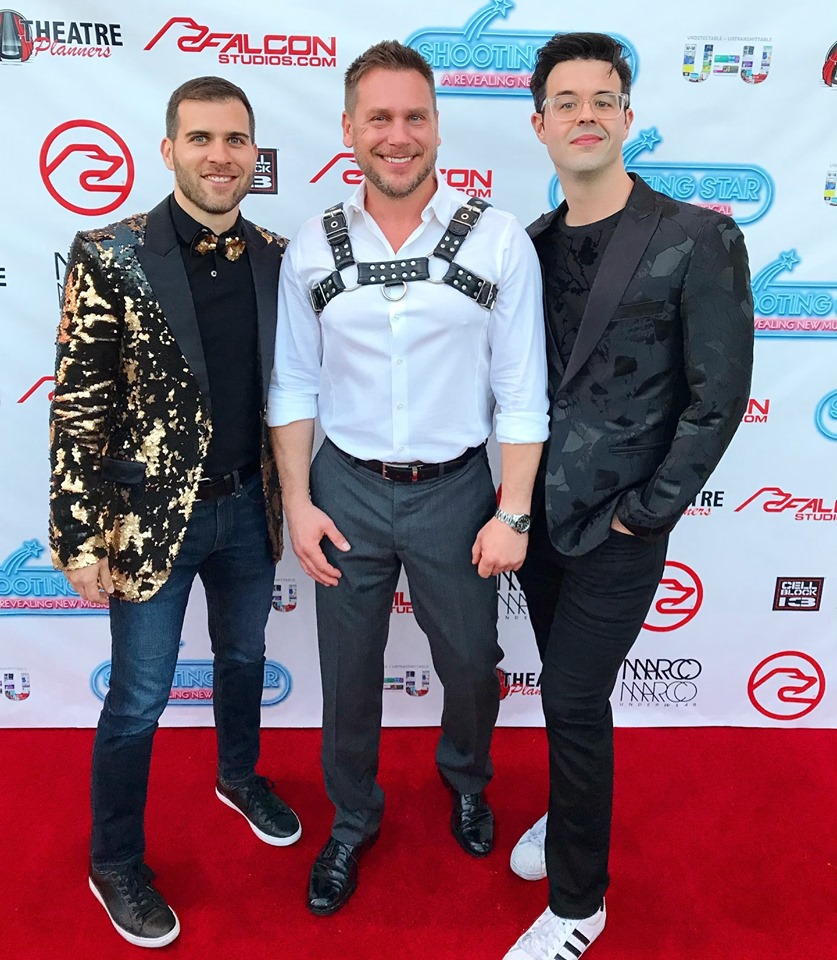
The creative team of “Shooting Star”: choreographer Jim Cooney, Florian Klein and director Michael Bello (left to right). (Photo: Facebook/ShootingStarMusical)
That the Offenbach research world is embracing its porn past (and future?) at a mega-conference in Cologne and Paris in 2019 is … also fabulous. The “Discourses and Identities” panel will be hosted by Laurence Senelick, by the way, Albert Gier is also part of it. And if you haven’t guessed already, I am the person talking about “The Birth of Operetta from the Spirit of Pornography.” I wish I could bring Mr. Nadalini along to sing the Air de Pâris (“Au mont Ida”) for demonstrational purposes and face his Offenbach destiny “Undressed,” as another fabulous Zaufke/Klein song goes.
The production of Shooting Star will run for six weeks in Los Angeles and can be seen there during Pride Season. It might still be work-in-progress, and it could use different orchestrations, but I’d love to have a cast album, because hearing Taubert Nadalini is a treat, whether together with Carson Robinette in “All the Lovers” or with Nathan Mohebbi in the snappy “I’ll Keep My Clothes On.” And then there is Bettis Richardson as an aggressive “Tiger Black” with songs such as “Party Like a Porn Star” and Karole Foreman with her eleven o’clock number “He Was My Friend.” (And, yes, Michael Scott Harris’s “Golden Days” number must also be mentioned again.)
The staging at the Hudson Theatre is the first public production, after an industry reading in NYC last year and another one in LA, all sponsored by Charles Leslie from the Leslie-Lohman Museum of Gay and Lesbian Art in New York.
I’m very curious to see where this show will go next – and the fact that both my parents enjoyed it, and complimented Florian Klein on his work afterwards, makes me believe that it has potential beyond a gay core audience. Florian Klein thanks his own parents for their ongoing support in the program, which I find incredibly endearing.
To quote Laura Kipnis one last time: “Audiences constitute themselves around things that matter to them, and stay away in droves when no nerve is struck.” Shooting Star definitely strikes a nerve, as does Nana and Offenbach. Bringing the elements back together, just like the current revived interest in Weimar Republic culture with its combination of “hedonism, sex, and fear,” might be an interesting future for 19th century operetta. The genre’s dimly lit corridors are full of “larger issues.” Rediscovering them is well worth the effort.
For more information and performance dates of Shooting Star, click here. For details about the Offenbach conference in Cologne, click here.

[…] A work in progress, still, Shooting Star has the muscles to make it to the big stage. I look forward to booking my seat at the Pantages or the Ahmanson a few years down the road. Read the Operetta Research’s review […]